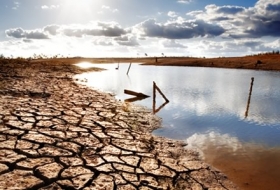Rich Nations Vulnerable to Water Disasters

The growing shortage of water - a perennial problem in the world's poorer nations - is expected to eventually reach the rich nations in the Western world.
The United States, Spain, Australia and the Netherlands are likely to face the consequences of climate change resulting in water-related disasters, including droughts, floods, hurricanes and sea-level rise.
"Even the world's richest nations are not immune," U.N. Secretary-General Ban Ki-moon warned Tuesday
Citing official U.S. figures, he said the state of California, the
world's fifth largest economy, "could see prime farmland reduced to a
dustbowl, and major cities running out of water by the end of the century".
Blaming it on the negative impact of global warming, he said that climate is
changing - globally. "And so, therefore, must we."
He quoted scientists as saying that by 2020, 75 to 250 million people in
Africa will face growing shortages of water due to climate change.
"Yields from rain-fed agriculture could fall by half in some African
countries in the next 10 years. These are frightening scenarios," he
declared.
Dr. Mark Smith, head of the Water Programme at the International Union for
the Conservation of Nature (IUCN), agrees that a global water crisis is on
the way.
Asked about the water shortage in cash-strapped California, where Governor
Arnold Schwarzenegger recently declared a drought emergency, Smith told IPS
that climate change poses many hazards in the world's rich nations, and many
are the same as those worrying people in developing countries.
For example, he pointed out, increased drought is a major concern in places
like Spain, Australia and California (in the United States), and sea-level
rise could be a disaster to the Netherlands.
"The difference is that in the rich world, there is very often the means to
deal with the problem: to protect people from impacts and to spread the
risk," Smith said.
But the danger of impacts on developing countries, he argued, is much a
higher profile concern because poor people and poor countries have much less
capacity to cope.
Ger Bergkamp, director general of the World Water Council, told IPS the
situation in California could be seen as a leading case of a State touching
the boundaries of managing water in a conventional way.
With a population that keeps growing, an economy that keeps expanding, and a
snowpack that keeps melting ever faster, water scarcity has become a
reality, he said.
"Where other regions still buy their time, California has to face a
situation that we will see more and more often around the world," he said.
This is true not only in the poor countries but increasingly so in emerging
economies and in well developed economies, he added.
Responding to these situations will demand a concerted action from
governments, civil society and business to invest in water efficiency,
increasing underground water storage, and allocating water in a smarter way
among users.
"It will require nothing less than establishing a new culture of water as a
precious resource and corner-stone of economic and social development and
environmental sustainability," Bergkamp said.
At a roundtable discussion in May, the chair of the U.N. Advisory Board on
Water and Sanitation Prince Willem-Alexander of the Netherlands told
delegates that water and agriculture are inseparable.
Agriculture consumes 70 percent of all freshwater withdrawals and 90 percent
of overall consumption, he said.
"And, so, the water crisis is in many ways an agriculture crisis. We must
change the way we grow our food," Willem-Alexander said.
Warning that water scarcity is on the rise, he said that by 2025, 1.8
billion people will live in countries or regions with absolute water
scarcity. And fully two-thirds of the world population could face conditions
of water stress.
"Yet we are not responding. Conflicts between water haves and water
have-nots will lead to social instability and unrest," he added.
Prince Willem-Alexander also said that climate change is bringing much
greater variability in rainfall.
Rainfall in some areas is increasing, while in others it is decreasing, by
as much as 20 percent. Such fluctuations make farming much more difficult,
he noted.
"Climate change also will surely bring a significant increase in floods and
droughts and other extreme water events," he warned.
Implicitly singling out the food habits of rich nations, he referred to
changing consumption patterns and diets. He said growing one kilogramme of
wheat requires about 1,000 litres of water. Producing one kilogramme of beef
demands 16 times that much water.
"The diets of North Americans and Europeans use about 5,000 litres of water
per person per day," he said.
Compare that to the vegetarian diets of Africa and Asia, which require on
average 2,000 litres.
As people climb out of poverty, and change their diets, the demand for water
to produce food increases.
"We cannot expect mankind to change its eating habits overnight, so it is
evident that the agriculture and water sector have to join forces and
drastically reduce by at least 50 percent the use of water to produce our
future food requirements," he declared.
This article is reproduced with the kind permission of the
Inter Press Service News
Agency (IPS).
Visit IPS News for more news
and articles and to
subscribe
to free newsletters.